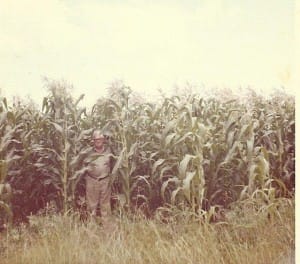The End

The End
In 1921, Gervas Hughes, newly arrived in Que Que from England, went to work at East Clare Ranch. Every day, in a Scotch-cart pulled by four oxen, he collected cows that had died from the drought. His job was to boil them in 44 gallon drums, feed the meat to pigs, dry the bones and grind them in a large coffee type mill, worked by a mule, walking around in a circle.
In 1976, African terrorists, determined to over-throw the Rhodesian government, started to make their presence felt around Que Que.
The End
Gervas Hughes was finally persuaded by the police to construct a massive fourteen strand security fence around the Giraffe Farm house. He was not happy to pay for it. He believed that the Government should pay to protect him.
A monitor near the main bedroom was connected to the fence. If the alarm sounded, the monitor’s red lights would indicate which side to investigate.
White farmers had to impose a curfew from dusk to dawn, locking themselves in and sending their black servants to their homes. Gervas and Dorothy were armed. Dorothy was issued with an Israeli Uzi machine gun by the security forces and told to take it with her when she went to milk her cows. She hated guns. She wrapped it tightly in a plastic bag to keep it clean.
Gervas, because his upper arm muscles were wasted from polio, could only handle a 3.8 automatic pistol. One day, at the farm gate near the Gokwe road, he discovered that someone had tied the latch with wire. He left his gun and money bag on the Ute’s front seat while he battled to open the gate. A thief, hidden in nearby bushes, stole the pistol and the money, a month’s wages for his workmen. The old man was reprimanded by the police for leaving his firearm unattended, a punishable offense.
In order to deter terrs (terrorists) from ambushing him on the road to town, Gervas bought a gun with twelve barrels. The contraption was bolted to his roof-rack and loaded with twelve heavy ball SSG shot-gun cartridges. If he pulled a lever, the gun would flick from vertical to horizontal, firing all twelve barrels at once. The idea was to blast everyone in a half circle in front of the Ute. Nobody tried to ambush Gervas but the Que Que police were upset every time he drove into town without unloading the gun.
In 1980, after a settlement had been reached, Tim visited his father in the new Zimbabwe. It was still considered unsafe out in the bush where terrs might not have received the message to stop fighting. Gervas lent Tim a service revolver.
His father complained that someone had been trying to steal one of his water pump engines and damaged its cover. To protect the pump, Gervas wanted Tim to set up the twelve barrel gun, removed from his Ute roof-rack at the end of hostilities. He refused. He made the pump cover more tamper-proof.
The following year, Tim returned again, to help negotiate the sale of Melrose Farm, at last. Gervas was reluctant, but Dorothy knew that it was time.
Gervas, aged 82, wrote his last letter to his son on Sunday 24th April 1983. He included newspaper cuttings about the drought and details of local farmers killed in their homes. Two months later he was shot dead and Dorothy was critically wounded.
This completes the Hughes saga begun fifteen months ago. I would like to thank Tim Hughes for the privilege of free use of his manuscript Matambega and Son and for excerpts from the late Joan Freyburg’s book, Rain on the Roof, and photographs from the late John Millard’s Never a Dull Moment. I will be separating the Hughes blogs so they stand on their own and I hope people will continue to enjoy them in the future. They began in the Boer War and I have enjoyed a wonderful correspondence with Tim 111 years later.
Friday, August 20, 2021
With great sadness I report that Tim Hughes passed away this week. Sharing with me his father’s unpublished memoirs of farming in Southern Rhodesia in the pioneering days provided a wonderful window on the challenges, hardships and rewards of those times. As did his own memories of school days at Chaplain and Plumtree. Over a fifteen-month period we enjoyed a wonderful relationship working on bringing these short stories to you. Although I never actually met him we stayed in touch thereafter.
My sincere condolences to his wife, Eleanor, and the extended family.
I invite you to share your tributes to Tim with your own memories of him here on Comments or privately through me to the family at oncecalledhome@gmail.com
